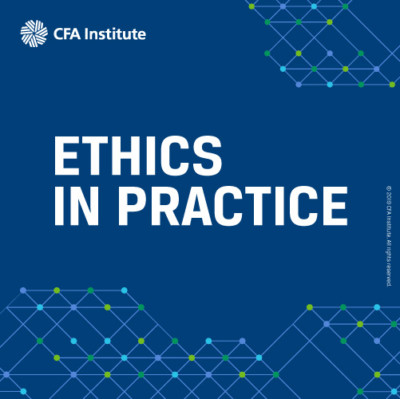Ethics in Practice: Consumer Protection. Case and Analysis–Week of 29 April
Check out the analysis to see how you did in analyzing this week’s case (29 April) and determining which CFA Institute Standard was involved.
Case
Harris, a CFA® charterholder, is the chief financial officer of a large aircraft manufacturer and serves on its investment committee, which has the responsibility of choosing retirement investment options for its employees. One of the retirement options is to purchase additional company stock. Harris becomes aware of an internal investigation that discovered design problems with the company’s newest aircraft, which causes it to become unstable during takeoff under certain conditions. Company engineers are working furiously on a fix for these problems. Harris knows, however, that if these problems become public, the information will significantly decrease the value of the company stock. Nevertheless, he does not disclose the information outside the company, and he continues to vote to make company stock purchase a retirement option for employees. Eventually, two of the company’s aircraft crash because of the design problems, resulting in a significant loss of life. The company’s stock price decreases significantly, and thousands of employee retirement funds suffer.
In the context of the CFA Institute Code of Ethics and Standards of Professional Conduct, Harris’s actions are
- appropriate because he believes the company will rectify the design problems before the information becomes public.
- inappropriate because he did not protect the interests of company employees by removing the company stock purchase as a retirement option.
- appropriate because he refrains from causing others to make investment decisions based on inside information.
- inappropriate because he failed to raise the design problems to the attention of aviation industry regulators.
Analysis
This case relates to duty to employer and material nonpublic information. As chief financial officer, Harris is a company insider and has a duty of loyalty to his employer that includes keeping company information confidential. CFA Institute Standard IV(A): Loyalty requires CFA members to “act for the benefit of their employer and not … divulge confidential information….” The design problems with the aircraft are confidential company information. But guidance for Standard IV(A) in the Standards of Practice Handbook makes it clear that CFA Institute members can go against this standard and divulge confidential employer information in the form of whistleblowing under certain circumstances. Protecting the lives of the general public by drawing attention to consumer product problems is arguably a valid reason for whistleblowing on corporate misconduct. Is Harris justified in whistleblowing in this case? No misconduct on the part of the company is alleged in the facts. Although there are dangerous design problems, it does not appear that the company is trying to conceal them but rather, it is working diligently to resolve the problems. Steps the company has taken to warn those using the aircraft or otherwise remediate problems are not provided. More facts are likely needed to determine whether or not whistleblowing is justified in this case.
In addition to the consumer protection issues, there is the investment aspect of the information. Clearly, the design flaw is material information that a reasonable investor would want to know about but it is not public information. Harris, who is in possession of this information given his position, has a duty under CFA Institute Standard II(A): Material Nonpublic Information not to disclose or cause others to act on this information. Voting to prevent employees from investing on company stock, because he knows the stock price may be devalued in the future would indirectly cause others to act on the material nonpublic information in his possession. Standard II(A) prohibits trading on material nonpublic information even if it is to benefit clients or, in this case, employees of the firm. Thus, choice B would not be a correct response. An argument could be made for any one of the other choices being the correct response, but further information would be needed to make the best choice.
Let us know what you think of Ethics in Practice by taking this short survey.
Have an idea for a case for us to feature? Send it to us at [email protected].
More About the Ethics in Practice Series
Just as you need to practice to become proficient at playing a musical instrument, public speaking, or playing a sport, practicing assessing and analyzing situations and making ethical decisions develops your ethical decision-making skills. The Ethics in Practice series gives you an opportunity to “exercise” your ethical decision-making skills. Each week, we post a short vignette, drawn from real-world circumstances, regulatory cases, and CFA Institute Professional Conduct investigations, along with possible responses/actions. We then encourage you to assess the case using the CFA Institute Ethical Decision-Making Framework and through the lens of the CFA Institute Code of Ethics and Standards of Professional Conduct. Then join the conversation and let us know which of the choices you believe is the right one and explain why. Later in the week, we will post an analysis of the case and you can see how your response compares.
Image Credit: ©CFA Institute


Option B on Harris’ case because option D would mean dealing in bad faith with his company’s interests.